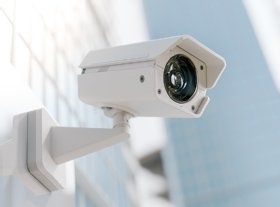What is CCTV (closed-circuit television)?
CCTV (closed-circuit television) is a video surveillance system in which signals are transmitted to a specific set of monitors and are not publicly broadcast. It is primarily used for security and monitoring.

CCTV systems enable real-time observation and recording of activities in designated areas. Unlike traditional broadcast television, CCTV operates on a closed loop, ensuring that footage is accessible only to authorized users.
How does CCTV work?
CCTV relies on strategically placed cameras that capture video footage, which is then transmitted to monitors or recording devices through private coaxial cables or wireless communication. CCTV systems often use digital technologies, enabling features like high-definition video, remote access and integration with other security systems. The closed-circuit aspect means that the video feed is limited to specific monitors, enhancing security and privacy.
Common applications of CCTV
Older CCTV systems used small, low-resolution, black-and-white monitors with no interactive capabilities. Modern CCTV systems can include color, high-resolution displays with the ability to zoom in on an image or track something -- or someone -- among their features. Talk CCTV lets an overseer speak to people within range of the camera's associated speakers.
CCTV technology has evolved significantly, expanding its applications across the following sectors:
- Public safety and crime prevention. Cities worldwide deploy CCTV to monitor public spaces, deter criminal activities and assist in investigations. For instance, Bengaluru, India, has geotagged over 530,000 CCTV cameras to enhance urban safety.
- Traffic management. CCTV systems monitor traffic flow, detect violations and manage congestion.
- Retail and commercial security. Businesses use CCTV to prevent theft, monitor employee behavior and ensure customer safety.
- Healthcare facilities. Hospitals employ CCTV to monitor patient areas, ensuring safety and compliance with protocols.
- Educational institutions. Schools use CCTV to enhance security, monitor student behavior and prevent vandalism.
- Industrial and hazardous environments. CCTV enables remote monitoring of dangerous areas, reducing the risk to human operators.
Technological advancements in CCTV
In the last few years, the following technology developments have significantly enhanced CCTV capabilities:
- Digital video recorders and network video recorders. These devices enable efficient storage and retrieval of high-quality video footage.
- Internet Protocol cameras. IP cameras offer higher resolution and can transmit data over networks, facilitating remote access and integration with other systems.
- AI integration. AI-powered CCTV systems can detect unusual activities, recognize faces and trigger alerts, enhancing proactive security measures.
- Edge computing. Processing data at the source -- i.e., the camera -- through edge computing reduces latency and bandwidth usage, enabling real-time analytics and faster response times.
Privacy concerns and regulations
The proliferation of CCTV has raised significant privacy issues. Primary concerns include the following:
- Data protection laws. In regions like the European Union, the General Data Protection Regulation mandates strict guidelines on data collection, storage and usage, affecting how CCTV footage is handled.
- Facial recognition technology. The integration of facial recognition with CCTV has sparked debates over surveillance and individual freedoms. The U.K., for example, calls for stricter regulations to govern such technologies.
- Public awareness and consent. It is crucial to make sure that individuals are informed about surveillance practices. Clear signage and transparent policies help maintain trust and compliance.
CCTV systems play a pivotal role in modern security infrastructure, offering benefits in crime prevention, traffic management and operational efficiency. However, their deployment must balance security needs with respect for privacy and compliance with legal frameworks.
Global trends and implementations
CCTV usage varies globally, driven by different priorities and challenges in the various countries. Here are some use cases:
- India. Cities like Chennai have implemented extensive CCTV networks to monitor public spaces, with control rooms overseeing thousands of cameras for enhanced security.
- U.K. CCTV surveillance in the U.K. emphasizes crime prevention and public safety, though it also grapples with privacy concerns.
- China. Known for its expansive surveillance systems, China integrates AI and facial recognition extensively, raising international discussions about privacy and human rights.
- U.S. CCTV is widely used in both public and private sectors, with real-time crime centers integrating various surveillance technologies to aid law enforcement.
As the technology evolves, ongoing global dialogue and regulation are essential to make sure that CCTV serves the public interest without infringing on individual rights.
Effectively powering edge devices like CCTV cameras around the clock is crucial and can be managed successfully with the right strategies. Learn the essentials of securing and maintaining reliable power at the edge.